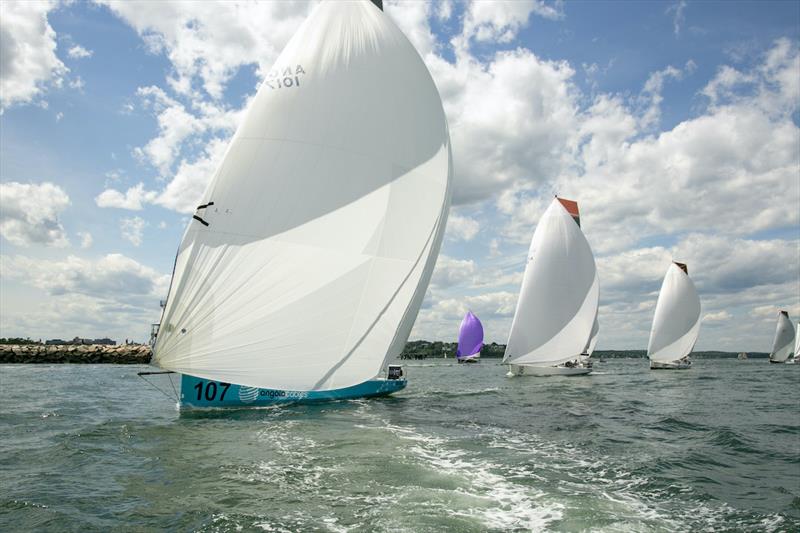
Celebrating The Race Around's forward-thinking approach to sustainability
by David Schmidt 6 Oct 2020 08:00 PDT
October 6, 2020

Class 40 racing action at the Atlantic Cup © Race Around/Billy Black
One of the coolest aspects of my gig as Sail-World's North American editor is the opportunity to learn about some of the most cutting-edge ideas in sailing. To be sure, the past decade has been rife with some amazing thinking, from foiling multihulls and monohulls, to double-handed distance-racing in the Olympics, to the rise of new distance and adventure races; the list is long, but I'll admit to being particularly impressed with a recent press release from The Race Around, which will begin in the summer of 2023.
This event is open to double-handed Class 40 teams and will feature a maximum of five legs. Likely stopovers include South Africa, New Zealand and Brazil, with a starting line in France and a finishing line in Portugal. However, finer-point details are still TBA at the time of this writing.
After the dearth of serious international racing in 2020 due to the still-ongoing pandemic, the news of any new sailboat race is reason for celebration, but what caught my eye in the event's press release was the sustainability initiative, dubbed the Futures Program.
Sail-World will be publishing an in-depth interview on the Futures Program in the next week (stay tuned to the website), but, as detailed in The Race Around's September 24 press release, the event is working hard to promote environmentally sustainable racing. This starts with reduced entry fees for teams that are actively working to reduce their carbon footprint during the runup to the 2023-2024 event (read: greener boatbuilding and refit projects), and will reach deeper to include life-cycle assessments on boat building - including the use of recyclable fibers and resins - via a series of workshops with various event stakeholders.
The goal, according to the event's presser, will be to leverage academic and commercial partnerships to gain a better understanding of the carbon ramifications of boatbuilding, and to share this data with the germane marine industry partners and players.
One of the ways that the Futures Program will accomplish this goal will be to literally build a floating case study. The Futures Ocean Racing Team will build a state-of-the-art Class 40 using recyclable materials, and the resulting boat will be raced around the world in 2023-2024 by a select crew of young, mixed-gender sailors.
Additionally, the Futures Program will also examine ways that owners and skippers can extend the life of existing Class 40s, and how they can sustainably refit their boats and deal with end-of-life disposal issues involving large fiberglass structures.
"Globally, we are seeing a radical shift in attitudes and practices across businesses and within society to deliver a greener future, and our objective is to build momentum within the sailing world, through Class40 and The Race Around, to be part of that push for real, data driven change," said Sam Holliday, co-founder of The Race Around, in the event's press release.
Education is another cornerstone of the project, and the Futures Program will develop a curriculum that focuses on local problems in each of the race's host cities.
Cooler still, data gathered through the Futures Program will be leveraged to create a new class of racing yacht and new industry standards - as well as mandatory carbon budgets - for the race's 2027 edition.
This last bit is especially interesting. As sailors, we tend to think in terms of data, whether (for example) it's minimum or maximum weights and measurements in one design or box-rule classes, the number of new sails that are allowed per year in certain classes (and when to allocate their deployment), target speeds and angles, or the number of dollars that an owner can reasonably devote to racing each year and how far these resources can be stretched. It's all part of the game, and, as sailors, it's one that we know how to win.
Adding another budgetary requirement in the form of carbon expenditure has the potential to add complication, of course, but it also gives clever and forward-leaning teams another opportunity to compete, and to create a better mousetrap, both in the form of the boats they build and the campaigns that they run.
Not only will this lead to cleaner, more sustainable sailing, but it will also likely lead to some innovative new materials and even cooler boats, both for around-the-world racing and (ideally) across the entire marine industry.
While these are still nascent days for The Race Around and the Futures Program, Sail-World applauds this line of thinking, and we would love to see it extend to other sailing events, from the America's Cup to the Olympics to casual beer-can racing.
May the four winds blow you safely home,
David Schmidt
Sail-World.com North American Editor